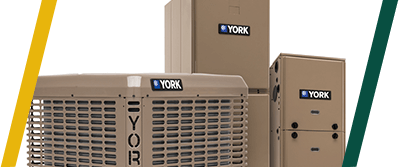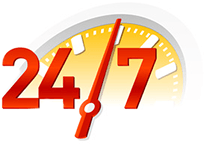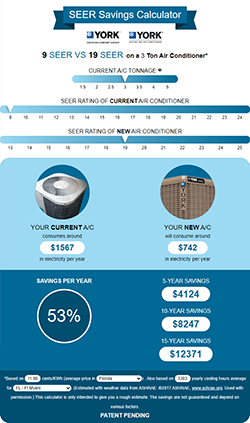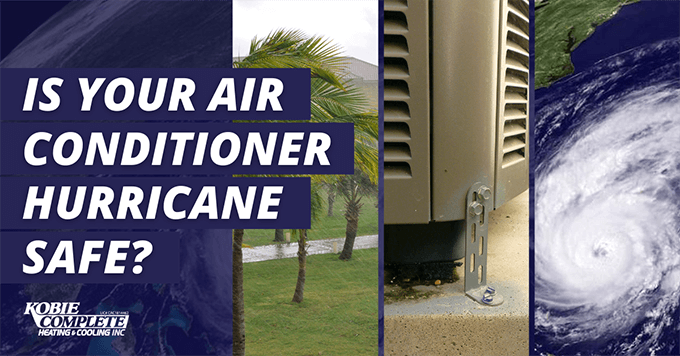
Atlantic hurricane season is June 1-November 30, and the NOAA is predicting another active season in 2022. The majority of named storms occurring during the month of September, but it’s never too soon for Southwest Florida residents to make sure we have our hurricane preparation plans in place. In your storm strategies, we encourage you not to overlook one item that’s both costly and integral to your home comfort. Of course, we’re talking about your air conditioner.
During a hurricane, your condenser (your air conditioner’s outdoor unit) is at the mercy of wind-blown debris, flooding and lightning strikes. A tropical system doesn’t have to be particularly ferocious in order to damage to an improperly secured air conditioner. If you’ve replaced your unit within the last few years, you know that this appliance represents a sizable investment. Whether your HVAC equipment is old or new, you don’t want to face the possibility of going without air conditioning in the wake of a tropical disaster. Especially when this scenario is preventable.
So, how do you protect your air conditioner from a hurricane? Here are some things you can do to prepare now:
Check for tie-down straps.
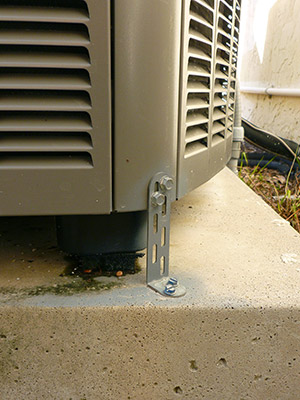
First, check to see if your condensing unit has tie-down straps (see photo). Tie-downs are wind-resistant up to 150 mph, and will prevent your unit from being yanked off its base and tossed around by high winds. If you’ve had a new air conditioner installed recently, chances are your HVAC contractor secured your unit to a concrete slab by way of tie-down straps. This measure has been required by Florida building code for the past several years, but if you have an older unit (from the 1990’s or earlier), it may not have tie-down straps. It’s also important check to make sure the straps have not rusted or deteriorated.
Invest in a surge protector.
It’s not just the wind, but also the lightning that poses a threat of damage to your air conditioner. Although you’ll need to turn off your air conditioner before the worst of the hurricane strikes, a surge protector can help protect your unit from the lighting storms that crop up as the tropical system approaches. At Kobie Complete, we provide a surge protector with any new AC installation. The high-quality surge arresters we install will absorb and divert the barrage of excess electricity to protect your air conditioner. Installing surge protectors is not required by building code. This is just a service we offer because we feel it’s important to help you protect your investment in any way we can.
Since lightning damage can occur during any of the electrical storms common here in Southwest Florida, a surge protector can prove useful not only for your air conditioner, but also for all major household appliances.
When a hurricane is approaching, here are a few extra measures you can take to help your air conditioner weather the storm:
- Turn off your air conditioner. Be sure to switch off both the thermostat and the breaker. Even with a surge protector, the unit could otherwise be damaged by constant power interruptions during the storm, or by storm debris that could become lodged in the running unit.
- Remove or secure outdoor objects that could become flying debris. This includes any lawn ornaments, planters, and furniture that might become missiles in high winds. Don’t store any loose items around your condensing unit, even if the area is fenced off. Also, it’s a good idea to make a habit of keeping large trees close to your air conditioner trimmed back. Otherwise, branches could break off and cause damage.
- Cover your condenser with a tarp. Although this won’t protect your unit against flooding, a tarp will provide a layer of protection from any flying debris.
After the storm has passed, take safety precautions before operating your air conditioner again.
You should turn on your air conditioner as soon as possible to avoid mold growth in your home and ducts – but only when it is safe to do so. You’ll need to inspect your condenser carefully before turning it on. After the storm has passed, go outside and look for any obvious damage, carefully removing debris that might have piled against or on top of your condenser.
Do not attempt to turn on your unit if:
- the unit has been underwater.
- you see any damage to the refrigerant or electrical lines.
- there is any sign of smoke.
If there is any doubt as to whether your unit is safe for operation, contact your HVAC contractor to have them inspect the unit first. Better safe than sorry!
Have questions about your air conditioner’s hurricane safety?
As a well-established Southwest Florida air conditioning company, we have the experience to help you prepare your air conditioner for a hurricane or help you get your system up and running again after a storm. If you’re in our service area, which includes Sarasota, Venice, Englewood, North Port, Port Charlotte and Punta Gorda, including the barrier islands, call us today. We’ll be glad to answer your questions.
Call Now: (941) 474-3691
Let’s all hope that the major storms will pass us by this year. But whatever happens, it never hurts to be prepared. We hope that this guide will help you protect your air conditioner through this hurricane season and in future seasons.
Last Updated: June 1, 2022

